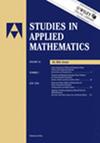Riemann–Hilbert method to the Ablowitz–Ladik equation: Higher-order cases
IF 2.6
2区 数学
Q1 MATHEMATICS, APPLIED
引用次数: 0
Abstract
We focus on the Ablowitz–Ladik equation on the zero background, specifically considering the scenario of pairs of multiple poles. Our first goal was to establish a mapping between the initial data and the scattering data, which allowed us to introduce a direct problem by analyzing the discrete spectrum associated with pairs of higher-order zeros. Next, we constructed another mapping from the scattering data to a matrix Riemann–Hilbert (RH) problem equipped with several residue conditions set at pairs of multiple poles. By characterizing the inverse problem on the basis of this RH problem, we are able to derive higher-order soliton solutions in the reflectionless case.
阿布罗维茨-拉迪克方程的黎曼-希尔伯特方法:高阶情况
我们重点研究了零背景下的阿布罗维茨-拉迪克方程,特别考虑了多极点对的情况。我们的第一个目标是建立初始数据和散射数据之间的映射,这使我们能够通过分析与高阶零点对相关的离散谱来直接引入问题。接下来,我们构建了另一个从散射数据到矩阵黎曼-希尔伯特(RH)问题的映射,该问题在多极点对上设置了多个残差条件。在这个 RH 问题的基础上描述逆问题,我们就能推导出无反射情况下的高阶孤子解。
本文章由计算机程序翻译,如有差异,请以英文原文为准。
求助全文
约1分钟内获得全文
求助全文
来源期刊

Studies in Applied Mathematics
数学-应用数学
CiteScore
4.30
自引率
3.70%
发文量
66
审稿时长
>12 weeks
期刊介绍:
Studies in Applied Mathematics explores the interplay between mathematics and the applied disciplines. It publishes papers that advance the understanding of physical processes, or develop new mathematical techniques applicable to physical and real-world problems. Its main themes include (but are not limited to) nonlinear phenomena, mathematical modeling, integrable systems, asymptotic analysis, inverse problems, numerical analysis, dynamical systems, scientific computing and applications to areas such as fluid mechanics, mathematical biology, and optics.
 求助内容:
求助内容: 应助结果提醒方式:
应助结果提醒方式:


